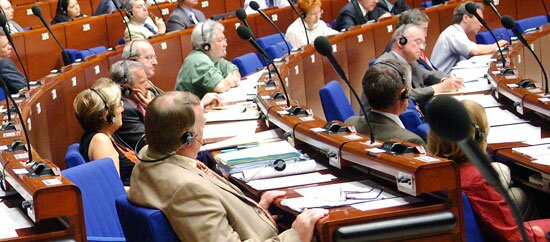




Using its powers under the founding Statute, the Assembly can:
- Demand action from 47 European governments, who must jointly reply
- Conduct probes to uncover new facts about human rights violations
- Question Presidents and Prime Ministers on any topic it chooses
- Observe elections and send delegations to mediate in crisis hot-spots
- Negotiate the terms on which states join the Council of Europe
- Inspire new national laws by proposing and giving opinions on treaties
- Request legal opinions on the laws and constitutions of member states
- Sanction a member State by recommending its exclusion or suspension
Though it has no power to pass binding laws, PACE holds a constant dialogue with governments, national parliaments, other international organisations and civil society which “sets the agenda”. In this way, its texts filter down through law and practice to improve the lives of Europeans everywhere.
Demand action from 47 European governments, who must jointly reply
Through its recommendations, the Assembly demands action on behalf of the 800 million Europeans it represents – and the 47 governments of the Council of Europe, represented in the Committee of Ministers, are obliged to respond. In practice, the Assembly often acts as the “motor” for the Council of Europe, driving forward new ideas, setting strategic direction and initiating many of the Council’s most important activities.
Conduct probes to uncover new facts about human rights violations
The Assembly has produced powerful reports which uncover new evidence of shocking human rights violations, such as torture taking place in secret prisons on European soil. Headlines around the world have helped to put pressure on governments, leading to high-profile national or international inquiries which have sought to bring those responsible to justice and make sure such things never recur.
Question Presidents and Prime Ministers on any topic it chooses
Presidents, Prime Ministers or other leading figures who address the Assembly are obliged to answer questions from the parliamentarians, who are free to raise any issue they choose. The Chair of the Committee of Ministers – representing the 47 governments – must also face such parliamentary scrutiny at every session. It is one of the ways the Assembly holds Europe’s governments publicly accountable for their policies and actions.
Observe elections and send delegations to mediate in crisis hot-spots
Assembly delegations – made up of parliamentarians who have themselves been elected – regularly observe elections in member or partner countries, providing a valuable litmus test of democratic practice on the ground. The President or high-level delegations will also frequently visit crisis hot-spots to mediate using the tools of “parliamentary diplomacy”, nudge antagonists towards compromise or assess the situation against Council standards.
Negotiate the terms on which states join the Council of Europe
The Assembly must give its green light before any country can join the Council of Europe. The Assembly has used this veto power, especially during the wave of enlargement from eastern Europe after 1989, to set conditions on membership – obliging states to promise many major changes (such as ending the death penalty) before they can “join the club”.
Inspire new national laws by proposing and giving opinions on treaties
Around 40 per cent of the Council of Europe’s 200-plus conventions – or multilateral treaties – were inspired by the Assembly. The European Convention on Human Rights is the most well-known, but there have been many others, including recent ones to help national minorities or protect women against domestic violence. The parliamentarians can press for improvements as these texts are being drafted, and must be consulted before they enter into force, helping to improve national law and practice across Europe.
Request legal opinions on the laws and constitutions of member states
If it is concerned by changes in the laws or constitutions of a member state, the Assembly can ask the Council of Europe’s Venice Commission – a group of independent legal experts – to give an opinion. These opinions carry great weight, and often result in the country concerned bringing its new law into line with Council standards.
Sanction a member state by recommending its exclusion or suspension
If a state seriously violates Council of Europe standards, the Assembly has the power to suspend a national delegation, or remove its voting rights – a sanction that has been used on several occasions. In the worst cases, it can recommend that a state be expelled from the Council of Europe.
